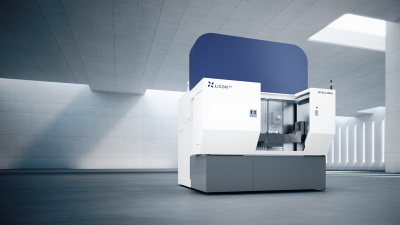LiFLEX I 12126: Fast and robust for lightweight automotive construction

At this year's EMO in Hanover in September, the Laupheim-based machine manufacturer will be presenting the further development of the LiFLEX I 12126. The new single-spindle machining center will showcase a hitherto unique combination of dynamics and cubature that can be used for significantly larger machining sizes - as is the case with structural components. Chip-to-chip time is reduced by half. Additional benefits as a cost reducer are provided by Licon Added Value Analysis, or LAVA for short, to make predictive maintenance possible digitally and in real time.
As a further development, the single-spindle LiFLEX I 12126 can machine structural components in even larger dimensions than before. The machine operates with 4 or 5 axes, is particularly fast, dynamically stable and robust. It is primarily designed for machining large structural components made of light metals such as aluminum. The tool change time is 1 second. With rapid traverse speeds in the linear axes of up to 150 m/min, high acceleration and jerk values, the machine is currently one of the most dynamic of this cubature on the market. Particularly short cycle times and thus maximum productivity are the greatest advantages for the customer.
"One application is the machining of auxiliary beams for passenger cars. Here, it is important that the large component can be positioned anywhere in the room and that machining can be carried out at all intended points - if possible without the additional use of angular heads. To ensure the overall performance of the machine, we rely exclusively on components from our own modular LiFLEX system," says Winfried Benz, Managing Director of Licon.
Also as an twin-spindle machining center in a class of its own
Based on the LiFLEX machine concept, Licon has developed and established a total of four different platforms and a variety of different machine configurations on the market in recent years. The machining centers are characterized above all by the free choice of three different loading variants such as direct loading, double trunnion and pallet changer. The optimum solution can be selected from the concept variants for each individual application.
Double-spindle machining centers are used where high demands are placed on performance and quantities. Winfried Benz explains, "The performance of our twin-spindle machines is demonstrated in the production of large front knuckles for the front axle of an SUV. Such long, complex parts are normally produced in two setups, because the cubic dimensions do not allow them to be produced in one. We can do it in one setup and produce two components in one clamping fixture. This is made possible by the large cubature of our five-axis two-spindle machines combined with smart solution expertise in the clamping fixtures."
More production flexibility through independent axes
As a further innovation, Licon offers i³ technology, which provides more production flexibility through independence in three axes. While often in double-spindle machining centers the two spindles are coupled, there are already independent Z axes with the basic configuration. In addition, i³-technology creates complete decoupling and independence in all three linear axes.
Licon Added Value Analysis, or LAVA for short, is also attracting more and more attention on the market. At its core, this involves the digital processing of a wide range of information relating to condition analysis, predictive maintenance and optimization of cutting processes. Licon can record the condition of its machines worldwide using suitable sensor technology. Typical physical variables such as force, temperature and vibration signals can be read out and evaluated individually.
Convincing package - not only for automotive
At a time when the industry is discussing digitization, cyber security, artificial intelligence, electromobility and a new understanding of sustainability, Winfried Benz is optimistic about the future: "Vehicles are being built increasingly lighter. In this respect, the demand for large-cubic structural components is steadily increasing. In the future, too, every car will have four wheels and a steering system and will thus need structural components, regardless of whether it has an internal combustion engine, electric drive or other alternative forms of powertrain."
In addition to large international customers from the automotive industry, Licon is also increasingly being discovered by smaller and medium-sized companies that are not at home in automotive construction. Applications include series machining of components for lawnmower motors, stainless steel pumps, fittings or door closers. In order to continue to drive growth, the Laupheim-based company has further expanded its service locations in Europe, Asia and America in terms of personnel and infrastructure.
About Licon
Licon is a leading system supplier of production lines for the mechanical series processing of complex components. Its customers include well-known automotive manufacturers and their suppliers in Europe, America and Asia, as well as companies from various other industries. In addition to product development, the company's core competencies include the manufacture of machine components, their system integration and software development. In addition to its own subsidiaries in Michigan, USA, and Beijing, China, Licon employs more than 200 people at its headquarters in Laupheim, Germany.